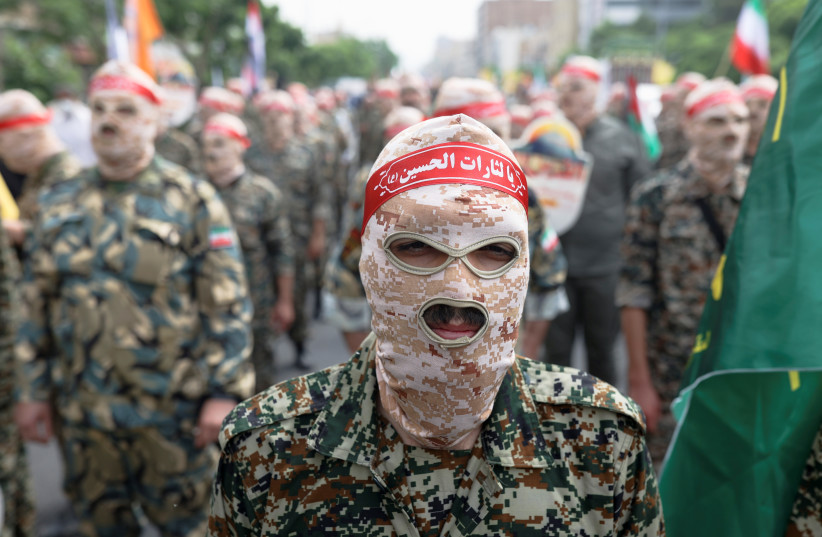The persistence of the Quds Force – opinion
The Quds Force, an elite paramilitary arm of Iran’s Islamic Revolutionary Guard Corps (IRGC), is a clandestine network with a history deeply rooted in spreading theocratic ideology and engaging in malign activities across the Middle East and beyond.
Under the presidency of Ebrahim Raisi, concerns about the Quds Force’s role and its potential threat to global security have escalated as it continues to operate covertly and support proxy groups, amplifying instability in various regions.
The Quds Force has gained infamy for its involvement in supporting armed groups and militias in conflict-ridden countries such as Iraq, Syria, Lebanon, Afghanistan, and Yemen. Utilizing these groups and local recruits, it pursues an expansionist agenda aimed at advancing Shi’ism and Khomeinism. The force is seen as an instrument of the autocratic Iranian regime, dedicated to exporting its radical ideology and fomenting chaos.
A global threat
The US Department of the Treasury designated the Quds Force as a Foreign Terrorist Organization (FTO) in 2007, marking a significant recognition of its threat on the global stage.
Canada and Israel followed suit, underscoring the dangerous nature of this paramilitary entity. The Quds Force’s operations have historically been shrouded in secrecy, making it difficult to ascertain its true strength and influence.
Over the years, the Quds Force has engaged in activities ranging from supporting terrorist organizations to promoting sectarianism and terrorism in the Middle East, Africa, and even the Latin American hemisphere. Its actions align with the strategy of Ayatollah Ali Khamenei, the Supreme Leader of Iran, aiming to spread extremism, antagonism, and an aggressive anti-Western agenda.

This agenda has led to the support of extremist groups and fueled sectarian violence across multiple regions.One pivotal event that heightened global concerns was the failed assassination attempt on the Saudi ambassador to the United States in 2011, orchestrated by the Quds Force.
The incident highlighted the organization’s audacity and intent to target high-profile individuals on foreign soil. Additionally, Quds Force campaigns against American and Israeli interests underscore the gravity of the threat.
The Quds Force underwent a transition in leadership after the assassination of its commander, Qasem Soleimani, in January 2020. His successor, Esmail Qaani, and deputy commander Mohammad Reza Fallahzadeh have continued the organization’s anti-American and anti-Israel agenda. Their close association with Soleimani during his tenure has influenced their ideology and operational tactics, furthering the dangerous trajectory of the Quds Force’s activities.
With Raisi’s ascent to power, the Quds Force remains focused on undermining the US and Israel, contributing to regional crises, and endorsing antisemitism and terrorism.
The Quds Force’s activities are in line with its long-term objectives of spreading chaos and destabilizing the Middle East. The international community must not underestimate the potential for further escalation of terrorism under Raisi’s administration.
The recent appointment of Fallahzadeh as deputy commander of the Quds Force is noteworthy. It symbolizes a continuity of leadership and a commitment to the organization’s core objectives. Fallahzadeh, known for his radical Shia ideology and close ties to Soleimani, represents a concerning shift towards a more aggressive approach.
This new leadership tandem of Qaani and Fallahzadeh is reminiscent of the Mughniyeh-Soleimani alliance, focusing on militant proxy models and cultivating ties with various terrorist groups.
Despite this threatening outlook, it is essential to recognize that the Quds Force operates on a global scale yet lacks the capability for direct confrontation with major world powers such as the US and Israel. The Iranian populace views the bombastic speeches of IRGC and Quds Force commanders with skepticism, aware of their exaggerated claims.
In conclusion, Raisi’s presidency is cause for heightened concern regarding the Quds Force’s relentless pursuit of its nefarious objectives. Its persistence in supporting terrorism, endorsing extremism, and seeking to destabilize regions remains a significant global threat.
The international community must unite to counter this menace by employing diplomatic, intelligence, and targeted sanctions approaches to neutralize the Quds Force and ensure the safety and stability of the affected regions.
The writer is a counterterrorism analyst and Middle East studies researcher based in Washington. A Jewish Kurd from Iran, he is the author of The Gruesome Mullah. See more at www.erfanfard.com.





Comments are closed.